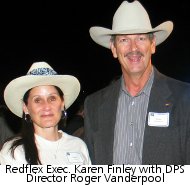Article from: www.thenewspaper.com/news/31/3136.asp
5/11/2010
Arizona: Judge Slams Redflex On Eve Of Court Case
Redflex starts off on a sour note with judge in photo enforcement Lanham Act case.
 A federal judge on Thursday sharply criticized the legal filings of an Australian photo enforcement vendor less than two weeks before a jury trial was scheduled to begin. Redflex Traffic Systems is being sued by its Arizona-based rival, American Traffic Solutions (ATS), on the grounds that the Melbourne-based firm won the recently canceled statewide speed camera contract with the Arizona Department of Public Safety (DPS) by allegedly lying about the certification of its equipment. If it loses, Redflex could be forced to pay its rival millions in potential damages for lost business. Already, the company's overall legal defense bill has reached $6.2 million for the past year.
A federal judge on Thursday sharply criticized the legal filings of an Australian photo enforcement vendor less than two weeks before a jury trial was scheduled to begin. Redflex Traffic Systems is being sued by its Arizona-based rival, American Traffic Solutions (ATS), on the grounds that the Melbourne-based firm won the recently canceled statewide speed camera contract with the Arizona Department of Public Safety (DPS) by allegedly lying about the certification of its equipment. If it loses, Redflex could be forced to pay its rival millions in potential damages for lost business. Already, the company's overall legal defense bill has reached $6.2 million for the past year.
ATS has been methodical in its attack on its rival. After realizing that Redflex illegally imported German and British-made components for its traffic camera systems, ATS filed a complaint with federal authorities, forcing Redflex to settle with the Federal Communications Commission (view consent decree). Having established that Redflex was unable to operate its equipment legally, ATS now argues that Redflex falsely advertised speed cameras as "approved" for use to a number of municipalities. ATS used the testimony of a pair of independent experts to argue that the firm is entitled to be compensated for the revenue it lost as a result of the false claims allegedly made by Redflex. Redflex responded with a "Daubert" challenge to convince the judge to throw out the ATS expert witnesses as unreliable and unscientific. The challenge was denied.
"Under our Rule 16 order, the parties were required to disclose expert testimony back in August 2009," Martone wrote in his May 6 order. "Yet Redflex waited until April 20, 2010, ten days before the final pre-trial conference, to file its Ingberman motion, and April 26, 2010, four days before the final pre-trial conference, to file its Keeling motion. This was so late, plaintiff had no opportunity to respond... before the conference. If a party is serious about a Daubert issue, that is, above and beyond a garden variety objection under Rule 702, its motion should be filed and heard long before the final pre-trial conference, with an opportunity for the opposing party to respond, an opportunity for a reply and a chance for the court to read, consider the matter, and hold an evidentiary hearing if necessary. Redflex chose a different path."
Martone, an Arizona Supreme Court justice before being elevated to the federal bench, seemed to grow tired of the failure of Redflex to abide by courthouse rules. In February, Martone issued a rebuke to Redflex after the company's lawyers began uploading multiple, hundred-page documents to the court filing system at midnight before the deadline. Martone showed his exasperation with the latest Redflex filings.
"Its motions were thus too long, too late, and not within the letter and spirit of the Rule 16 order," Martone concluded. "They were an ambush of the court and counsel. They were thus properly denied as motions in limine. Counsel will simply have to make his objection at trial."
The trial is now expected to start May 18. A copy of the judge's order is available in a 30k PDF file at the source link below.
Source: Order in American Traffic Solutions v. Redflex (US District Court, District of Arizona, 5/6/2010)
Permanent Link for this item
Return to Front Page
 A federal judge on Thursday sharply criticized the legal filings of an Australian photo enforcement vendor less than two weeks before a jury trial was scheduled to begin. Redflex Traffic Systems is being sued by its Arizona-based rival, American Traffic Solutions (ATS), on the grounds that the Melbourne-based firm won the recently canceled statewide speed camera contract with the Arizona Department of Public Safety (DPS) by allegedly lying about the certification of its equipment. If it loses, Redflex could be forced to pay its rival millions in potential damages for lost business. Already, the company's overall legal defense bill has reached $6.2 million for the past year.
A federal judge on Thursday sharply criticized the legal filings of an Australian photo enforcement vendor less than two weeks before a jury trial was scheduled to begin. Redflex Traffic Systems is being sued by its Arizona-based rival, American Traffic Solutions (ATS), on the grounds that the Melbourne-based firm won the recently canceled statewide speed camera contract with the Arizona Department of Public Safety (DPS) by allegedly lying about the certification of its equipment. If it loses, Redflex could be forced to pay its rival millions in potential damages for lost business. Already, the company's overall legal defense bill has reached $6.2 million for the past year.